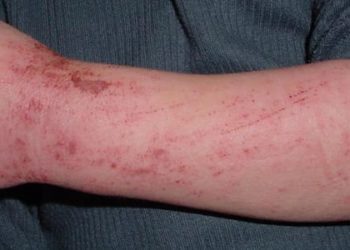Upadacitinib non-inferior to adalimumab for psoriatic arthritis treatment
1. Janus kinase (JAK) inhibitor upadacitinib showed non-inferior efficacy in improving psoriatic arthritis compared to standard-of-care adalimumab.
2. High-dose upadacitinib was associated with more frequent adverse events than adalimumab.
Evidence Rating Level: 1 (Excellent)
Study Rundown: Psoriatic arthritis (PA) is an autoimmune condition primarily affecting the skin and joints. The condition is treated with non-steroidal anti-inflammatory drugs (NSAIDs), glucocorticoids, or disease-modifying antirheumatic drugs (DMARDs). For inadequately responsive patients, the biologic tumor necrosis factor-α inhibitor adalimumab is a standard treatment. Upadacitinib, a JAK inhibitor, has been approved for the treatment of rheumatoid arthritis, another condition commonly treated with adalimumab. This trial investigated the efficacy and safety of upadacitinib for PA, against placebo and adalimumab. The study determined 15-mg and 30-mg doses of upadacitinib were shown to be superior to placebo and non-inferior to adalimumab in improving PA disease status, according to the American College of Rheumatology 20 (ACR20) response rates. Furthermore, the 30-mg dose of upadacitinib was superior to adalimumab in ACR20 response. However, this dose was accompanied by a higher frequency of adverse events. The main limitation was the safety of long-term use of upadacitinib or adalimumab cannot be made from the study. Nonetheless, this study provided significant evidence for upadacitibib as an alternative to adalimumab in treating psoriatic arthritis.
Click to read the study in NEJM
In-Depth [randomized controlled trial]: This randomized controlled trial enrolled 1,704 patients at 281 sites in 45 countries. Patients were included in the study based on joint appearance and radiographic signs of erosion, PA diagnosis, and documented plaque psoriasis. Patients previously treated with biologic or JAK inhibitor therapies were excluded from the study. Patients were randomized in a 1:1:1:1 ratio to receive 15-mg upadacitinib, 30-mg upadacitinib, placebo followed by upadacitinib at week 24, or 40-mg adalimumab, respectively. The primary outcome was the percentage of patients showing an ACR20 response after 12 weeks. ACR response was characterized as an improvement of at least 20% in joint symptoms and other disease activity markers. The study found ACR20 response in 70.6% of patients in the 15-mg upadacitinib group, 78.5% with 30-mg upadacitinib, 36.2% with placebo, and 65.0% of patients in the adalimumab group. The between-group difference in the 15-mg upadacitinib and placebo was 34.5% (95% confidence interval [CI], 28.2 to 40.7; P<0.001). The between-group difference in the 30mg upadacitinib and placebo was 42.3% (95% CI, 36.3 to 48.3; P<0.001). While both doses of upadacitinib were non-inferior to adalimumab, only the 30-mg upadacitinib dose showed the superiority of 13.5% (95% CI, 7.5 to 19.4; P<0.001). After 24 weeks, rates of adverse effects such as upper respiratory tract and opportunistic infections were more frequent in both upadacitinib groups compared to placebo. Overall, this trial established upadacitinib as an oral non-inferior alternative therapy to adalimumab for PA patients inadequately treated with standard nonbiologic DMARDs.
Image: PD
©2021 2 Minute Medicine, Inc. All rights reserved. No works may be reproduced without expressed written consent from 2 Minute Medicine, Inc. Inquire about licensing here. No article should be construed as medical advice and is not intended as such by the authors or by 2 Minute Medicine, Inc.







